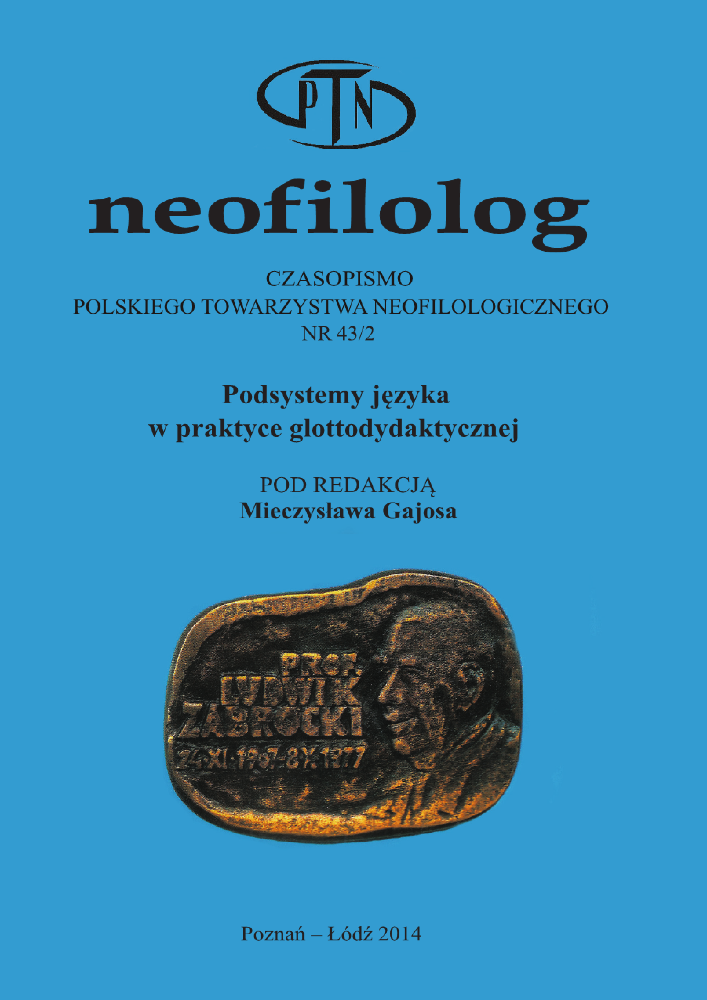Résumé
The paper discusses the issues of form-focused instruction in foreign language pedagogy with the special emphasis on the task-based language teaching. There is a growing realization among the researchers and the language educators that the formal aspects of the target language need to be incorporated into the language teaching in order to facilitate the learners’ in achieving high levels of accuracy as well as communicative effectiveness. The authors point out to different techniques and procedures that are used in task-based language teaching to stimulate learners’ reflection on the formal aspects of the target language and to develop their capacity of noticing the linguistic forms as they are engaged in meaning focused activities.Références
Batstone, R. 1994. «Product and process: Grammar in the second language classroom» (w) Grammar and the language teacher (red. M. Bygate, A. Tonkyn, E. Williams). London: Prentice Hall: 224-236.
Canale, M., Swain, M. 1980. «Theoretical Bases of Communicative Approaches to Second Language Teaching and Testing». Applied Linguistics 1: 1-47.
Doughty, C., Williams, J. 1998. «Issues and terminology» (w) Focus on form in class-room second language acquisition (red. C. Doughty, J. Williams). Cambridge: Cambridge University Press: 1-11.
Ellis, R. 1997. SLA research and language teaching. Oxford: Oxford University Press.
Ellis, R. 2003. Task-Based Language Learning and Teaching. Oxford: Oxford University Press.
Ellis, R. 2009. «Task-based language teaching: sorting out the misunderstandings». International Journal of Applied Linguistics 19 (3): 221-246.
Estaire, S., Zanon, J. 1994. Planning classwork: a task based approach. London: Heinemann.
Gascoigne, C., Parnell, J. 2013. «Tasks and Focus on Form: Connections in the US and Europe» (w) MultiTasks, MultiSkills, MultiConnections (red. S. Dhonau) www.csctfl.org/documents/2013Report/2013Reportweb.pdf. DW 28.07.2014.
Grim, F. 2008. «Integrating focus on form in L2 content-enriched instruction lessons». Foreign Language Annals 41 (2): 321-346.
Janowska, I. 2004. «Refleksyjne nauczanie gramatyki». Języki Obce w Szkole 6: 40-48.
Janowska, I. 2011. Podejście zadaniowe do nauczania i uczenia się języków obcych. Na przykładzie języka polskiego jako obcego. Kraków: Universitas.
Janowska, I. 2014. «Refleksyjność w świetle tekstów ‘Europejskiego systemu opisu kształcenia językowego’». Neofilolog 42/2: 143-154.
Long, M. H. 1991. «Focus on form: A design feature in language teaching methodology» (w) Foreign language research in cross-cultural perspective (red. K. De Bot, R. Ginsberg, C. Kramsch). Amsterdam: John Benjamins: 39-52.
Long, M. H. 1997. «Focus on Form in Task-Based Language Teaching». http://projectluisa.weebly.com/uploads/7/4/6/9/7469707/long_1997_intro_focus_on_form.pdf DW 28.07.2014.
Long, M. H. (red.) 2006. Problems in SLA. Mahwah, NJ: Erlbaum.
Nunan, D. 1989. Designing Tasks for the Communicative Classroom. Cambridge: Cambridge University Press.
Nunan, D. 2004. Task-Based Language Teaching. Cambridge: Cambridge University Press.
Pawlak, M. 2006. The place of form-focused instruction in the foreign language classroom. Kalisz-Poznań.
Puren, Ch. 1994. La didactique des langues étrangères à la croisée des méthodes. Essais sur l’éclectisme. Paris: Didier.
Puren, Ch. 2005. «Domaines de la didactique des langues-cultures: entrées libres». Les Cahiers pédagogiques 437: 41-44.
Rada Europy. 2003. Europejski system opisu kształcenia językowego: uczenie się, nauczanie, ocenianie. Warszawa: Wydawnictwa CODN.
Rada Europy. 2012. Un Cadre de Référence pour les Approches Plurielles des Langues et des Cultures. Compétences et ressources. Graz: Centre européen pour les langues vivantes; http://carap.ecml.at/CARAP/tabid/2332/language/en-GB/Default.aspx DW 25.07.2014
Richer, J.-J. 2012. La didactique des langues interrogée par les compétences. Fernelmont: E.M.E. & InterCommunications.
Samuda, V. 2001. «Guiding relationships between form and meaning during task performance: the role of the teacher» (w) Researching pedagogic tasks: second language learning, teaching and testing (red. M. Bygate, P. Skenan, M. Swain). Harlow: Longman: 119-140.
Schmidt, R. 1994. «Deconstructing consciousness: In search of useful definitions for applied linguistics». AILA Review 11: 11-26.
Skehan, P. 1998. A cognitive approach to language learning. Oxford: Oxford University Press.
Van den Branden, K. (red.) 2006. Task-Based Language Education. From theory to practice. Cambridge: Cambridge University Press.
White, J. 1998. «Getting the learners’ attention: A typographical input enhancement study» (w) Focus on form in classroom second language acquisition (red. C. Doughty, J. Williams). Cambridge: Cambridge University Press: 85-112.
VanPatten, B., Cadierno, T. 1993. «Explicit instruction and input processing». Studies in second language acquisition 15: 225-241.
Widdowson, H. G. 1998. «Context, community and authentic language». TESOL Quar-terly 32: 705-716.
Willis, J. 1996. A Framework for task-based language teaching. New York: Longman.
Willis, D., Willis, J. 2007. Doing Task-based Teaching. Oxford: Oxford University Press.
Licence
© Iwona Janowska, Agnieszka Rabiej 2019

Ce travail est disponible sous licence Creative Commons Attribution - Pas de Modification 4.0 International.
Auteurs :
Les auteurs de textes acceptés pour publication dans la revue Neofilolog sont tenus de remplir, signer et renvoyer à l'adresse de la rédaction, un accord sur l'octroi d'une licence gratuite pour les œuvres, avec obligation d'accorder une sous-licence CC.
En vertu de cet accord, les auteurs des textes publiés dans la revue Neofilolog accordent à l'Université Adam Mickiewicz de Poznań une licence non exclusive et gratuite et permettent l'utilisation de la sous-licence Creative Commons Attribution-NoDerivatives 4.0 International (CC BY-ND 4.0).
Les auteurs se réservent le droit de disposer librement de l'œuvre.
Utilisateurs :
Les utilisateurs d'Internet intéressés ont le droit d'utiliser les œuvres publiées à partir de l'année 2017 sous réserve des conditions suivantes :
- reconnaissance de la qualité d'auteur - l'obligation de fournir des informations sur la qualité d'auteur, le titre, la source (liens vers l'œuvre originale, DOI) et la licence, ainsi que l'œuvre distribuée ;
- sans créer d'œuvres dérivées - l'œuvre doit être conservée dans sa forme originale, p. ex. les traductions ou les interprétations ne peuvent être distribuées sans le consentement de l'auteur.
Tous les textes publiés sont soumis au droit d'auteur.
Autres :
L'Université Adam Mickiewicz de Poznań se réserve le droit à la revue dans son ensemble (mise en page, forme graphique, titre, conception de la couverture, logo, etc.).
.
